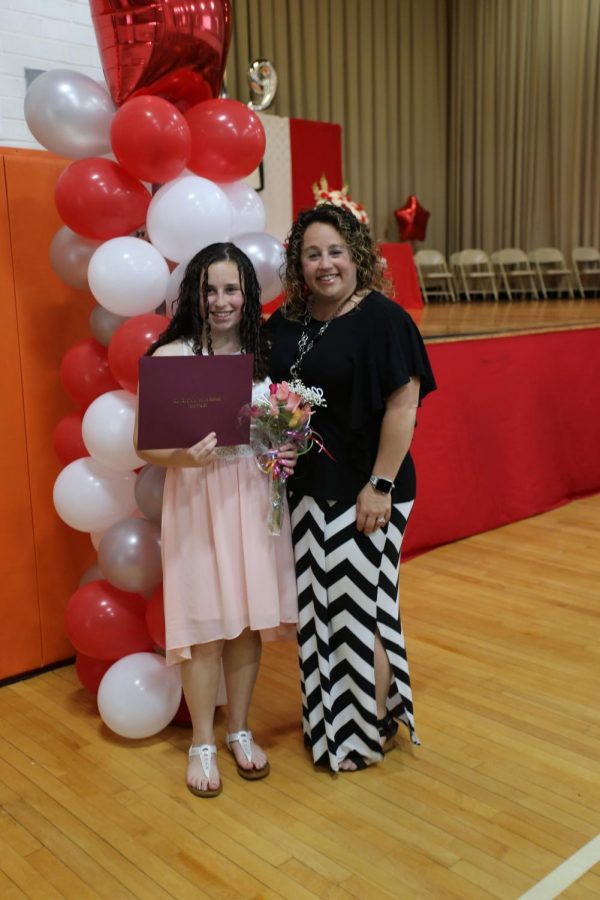On the road to recovery, families travel together
Cancer affects more than just the victim
For mother Melissia Morelli and her daughter, Hannah, a cancer diagnosis in their family prompted more reflection and priority placed on time spent together.
May 13, 2020
Life as you know it can change in an instant.
For Melissa Morelli, a Terryville woman who was recently diagnosed with breast cancer, a couple of minutes was all it took to completely flip life upside down. However, this diagnosis changed more lives than just one.
February 12, 2020. 2:00 p.m.
Having known about the cancer for three weeks prior, Melissa says that she was happy and excited to go into surgery and was waving to doctors, nurses, even patients on the way into the operating room. She just wanted to remove the cancer and start the recovery process.
However, that healing process has proven to be much more difficult for her than originally anticipated. But when asked about the hardships, she never says anything about the physical pain she endured.
Being a naturally nurturing person, the biggest struggle thus far has been “not taking care of others and others taking care of me.”
The mother of two always jumped at every opportunity to help friends and family by nature, and made sure that their needs were met, so being bedridden after her procedure challenged her quite a bit.
Her diagnosis has put things into perspective for the elementary school teacher and made her realize that she can’t take things for granted and can’t stress about the future, or smaller things that may not prove to be of much importance at all. She has learned to take things one day at a time, because time is precious.
This journey made her realize that she needs to “live more in the here and now,” she says – advice that she thinks lot of people might benefit by following.
Meanwhile, at 2:00 p.m. on February 12, Melissa’s daughter, Hannah Morelli, was stuck at school surrounded by friends, which served as a distraction from the surge of emotions she was feeling.
“I was nervous,” the 15-year-old recalls.
The feeling of not knowing how her mom was, or how surgery was going, was almost unbearable. Her father sent her updates from the waiting room via text as the day unfolded.
While the feeling of nervousness was slightly overbearing, like her mother, Hannah says that she was feeling happy that day as well.
Post-surgery brought lots of changes to everyday life for her as well, such as having to stay overnight at friends’ houses because mom needed to stay in the hospital or not being able to go places with friends as frequently. She also noted that she must be more cautious at home, to ensure that her mom heals safely, and needs to pick up more chores to help her parents, as her mom is still recovering from the double mastectomy and her dad has now returned to work.
As for long-term changes to life, Hannah says her mom’s diagnosis made her “realize that I can’t take things for granted.”
When asked to expand on this, she provides an example, saying “if I’m with family, I’m not on my phone as much, because I don’t want to take the time for granted.”
The experience has been very eye-opening, and she is now realizing how precious time can be, and how quickly lives can change.
Deborah Parkinson, the operations director at the Leever Cancer Center in Waterbury, says that cancer is a very complicated disease, that affects not only the patient, but the friends and family, too.
From her experience, people can be filled with anger or sadness upon first hearing the news. Some want all the information they can possibly have on the disease, while others choose to ignore it – just receive treatment and learn next to nothing new. She added that people react in a variety of ways.
Friends and family help tremendously, Parkinson says that having people you trust by your side help because “when you’re not feeling well, it’s hard to absorb things.”
The Leever Center strongly encourages patients to bring a loved one along, not only to help with the hardships, but to help process tons of new information when not feeling their best.
The center also has therapy groups and social workers that are also available whenever patients need, which Parkinson said help ease a lot of minds, if they are willing to talk.
A majority of the population is no stranger to the way that cancer is treated and how it makes you feel. In 2020, it is estimated that there will be around 1.8 million new cancer diagnoses and about 600,000 deaths because of the illness in the United States alone, according to the American Cancer Society. However, what most fail to realize, is that these people have families; they have children, parents, spouses, and friends, all of whom will also be affected. Because just as in Melissa’s story, cancer effects more than just the victim.

Mary Lee Garbowski • Jun 3, 2020 at 5:45 pm
My heart goes out to Mrs. Morelli and her family.
This was a beautifully written article.